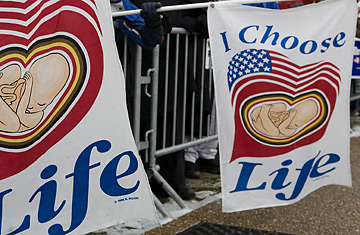
Anti-abortion protesters
In Illinois today, a federal judge is expected to hear an intriguing argument in the abortion debate. At issue: Is Aurora, Ill., a city of nearly 175,000 about an hour's drive west of Chicago, trying to stop Tuesday's scheduled opening of the nation's largest Planned Parenthood clinic because of political pressure from anti-abortion activists? Or was the clinic's true nature — that is, its Planned Parenthood genesis — not readily apparent to city officials when they originally approved permits for the building? Or is it a bit of both? The case is already one of the most heated in the nation's grassroots abortion wars, and protests in Aurora this past weekend drew hundreds of anti-abortion demonstrators.
The story began last winter, when Gemini Office Development LLC applied to build a 22,000-square-foot clinic on land zoned for medical use. The design's details included surgical rooms and various security features, such as bullet-proof glass. Construction proceeded. In July, however, local newspapers reported that Gemini is, in fact, a subsidiary of Planned Parenthood's local branch. Still, in August, the city routinely issued a temporary permit allowing the $7.5 million clinic to open on Sept. 18 with just two relatively minor provisions: install more exit signs, as well as glass at service counters. There seemed to be little legal questions about it at the time: It is normal for commercial concerns to use subsidiaries to conduct business and set up offices.
Of course, Planned Parenthood is not just a company. And abortion opponents in this historically conservative suburb abutting cornfields were outraged. An assortment of groups, including churches, organized around-the-clock protests outside the clinic, which is tucked between a supermarket, a Blockbuster Video, and a cluster of upscale homes. The debate embroiled this city as has few other issues: City council meetings began drawing hundreds of abortion opponents.
And so, amid the outcry over alleged inconsistencies in the application and testimony of Planned Parenthood's executives, Aurora city officials announced on Aug. 30 that the clinic's opening would depend on a fresh review of its building permit. "These concerns were raised once this became high-profile, and people began looking back at the process," says Carie Anne Ergo, the city's spokeswoman. Last Wednesday, the city told Planned Parenthood it "had no intention of allowing you to open for business," according to court documents. On Thursday Sept 13, Planned Parenthood responded with a lawsuit in U.S. District Court attempting to block the city's efforts to stop the clinic's opening, saying it was rooted in discrimination because the clinic would perform abortions.
Shortly after dawn on Saturday, hundreds of abortion opponents arrived at the clinic, which many people on all sides of the debate have started calling "Ground Zero." Some simply prayed on the sidewalk behind the clinic. Many carried signs reading, KEEP ABORTIONS OUT OF AURORA. Cheryl Hartnett, a 52-year-old Aurora retiree, said her "heart broke" when she learned the clinic is owned by Planned Parenthood. "There will be political consequences" for city officials, she warned Saturday, surrounded by a clutch of protesters. Meanwhile, people who live in the homes near the clinic are fearful of potential violence. For much of the weekend, police officers stood guard in front of the entrance to a subdivision behind the clinic.
In an interview, Steve Trombley, CEO of Planned Parenthood's Chicago branch, said his group initially used Gemini to shield the building's contractors and employees from harassment. "I was surprised our opponents didn't figure us out sooner — they monitor our every move," he said Saturday, standing in the clinic's spare, manila-colored lobby. "We answered every question the city asked. This is about political pressure form anti-abortion group," he said of efforts to block the clinic's opening. Abortion opponents say they could recall few cases in which Planned Parenthood used subsidiaries to open clinics. A Planned Parenthood spokeswoman said the use of subsidiaries to open clinics isn't part of a new national strategy, and that "affiliates use different approaches to meet the health care needs of communities."
Last year, Planned Parenthood provided birth control to about 2.5 million patients nationwide. The group says abortions accounted for 3% of its services nationally last year. Elsewhere in the country, abortion opponents have opened so-called crisis pregnancy centers, often next to Planned Parenthood clinics, to persuade women headed for abortions to reconsider the procedure.
In Aurora, abortion opponents promise their protests will continue even as Planned Parenthood says at least a dozen patients have made appointments for Tuesday. Across the city, meanwhile, the clinic seems to dominate conversation. "I'm shocked we're involved in the middle of this," Rick Lawrence, a city alderman, says.
